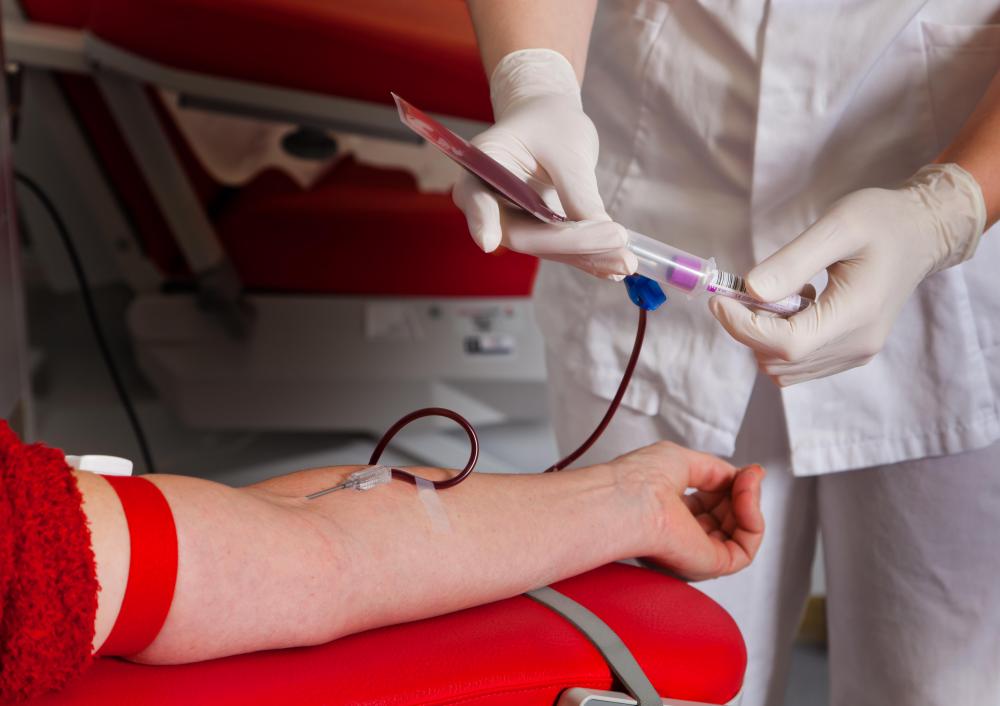At WiseGEEK, we're committed to delivering accurate, trustworthy information. Our expert-authored content is rigorously fact-checked and sourced from credible authorities. Discover how we uphold the highest standards in providing you with reliable knowledge.
What is Chronic Lymphocytic Leukemia?
Chronic lymphocytic leukemia, or CLL, is a cancer that affects the blood and bone marrow, the sponge-like substance inside bones which produces blood cells. It is referred to as a chronic condition because of the slow progression of the disease. It may take years for a person to move from the first stage of cancer to any of the later stages. Chronic lymphocytic leukemia affects the lymphatic system, mutating the white blood cells that fight infections in the body.
There are over 300,000 cases of leukemia around the world, and chronic lymphocytic leukemia is responsible for the majority of those cases. About 15,000 people in the United States alone are diagnosed with CLL a year, most of them older adults. Very few children develop this type of leukemia. The symptoms can be easy to miss, and may initially be passed off as being a prolonged cold or signs of aging. Symptoms for chronic lymphocytic leukemia include enlarged lymph nodes, fatigue, fever, night sweats, and weight loss. Due to the compromised white blood count, which suppresses a persons immunity, people with CLL also get sick easily.

Doctors aren't certain about what causes the gene mutations that cause CLL to start in the first place, but they know it is these gene mutations that cause the disease to progress. The lymphocyte white blood cells normally have a limited life span. As they die, an equal number of new white blood cells are created. Chronic lymphocytic leukemia changes the life span of white blood cells, making it considerably longer. Without the blood cells dying, the body quickly builds up a surplus. These extra cells gather in the bloodstream and major organs, and begin to cause problems by crowding out the health blood cells.

Chronic lymphocytic leukemia is diagnosed through a simple blood test that allows doctors to detect the number of cells in the blood. Doctors look for a high number of mutated white blood cells and a low number of healthy white blood cells. CLL may also be diagnosed through a bone marrow biopsy. After being diagnosed with CLL, doctors will determine how far advanced the cancer is.

If the cancer is in an early stage, the doctor will probably not advise any treatment. Only one in three patients in an early stage of chronic lymphocytic leukemia will ever progress to the point where they require treatment, and early treatment does very little to change the progression of the cancer. Later stages of cancer can be treated through chemotherapy and prescription medications. Some patients may try drug trials, and others have successfully treated CLL with bone marrow stem cell transplants.

Although CLL can affect anyone, most of the people who are diagnosed with it are over the age of 50. Women have a higher chance of getting it than men, and Caucasians are more likely to be diagnosed than individuals of other races. CLL is treatable, but it may increase a persons risk for developing other cancers. CLL is not usually fatal, but the decreased immunity associated with it may last, causing later complications, especially in older patients.
AS FEATURED ON:
AS FEATURED ON:

















Discussion Comments
Both people I know who have had CLL have been men, even though, according to the article, women are more likely to get it.
One person I know had chemotherapy for it and is doing well. The other person had treatment, and lived about five years or so.
This is one leukemia that often fools the doctors, I think.
Post your comments